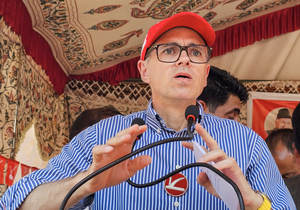New Delhi: Jammu and Kashmir Chief Minister Omar Abdullah has bluntly termed the dual governance model in the Union Territory — where he shares power with the lieutenant governor — a “recipe for disaster”, as he urged the Centre to keep its promise and restore statehood to the region at the earliest.
In his first sit-down interview since assuming office in October, Abdullah expressed cautious optimism over the Centre’s commitment to restoring J-K’s statehood, citing repeated promises made by Prime Minister Narendra Modi and Home Minister Amit Shah during election campaigns.
The chief minister’s candid remarks underscore the complex political landscape in Jammu and Kashmir, and the difficulties in pushing for a more defined and unified administrative leadership by virtue of getting statehood.
Abdullah drew parallels with corporate leadership, challenging anyone to name a successful business with multiple leaders.
“Let me just say this, having two power centres anywhere is a recipe for disaster… No organisation works well if there are multiple power centres…. there is a reason why our sports team has one captain. You don’t have two captains.
“Similarly, you don’t have two prime ministers or two power centres in the government of India. And most of India has one elected chief minister who is empowered with their cabinet to take decisions,” he told PTI’s senior editors at its headquarters.
“A dual power centre system is never going to work,” he said, citing the example of Delhi where the government shares power with the lieutenant governor in what has been a bitter and fractious experience.
Abdullah noted that Delhi is after all a small city state, while Jammu and Kashmir is a large and strategic region bordering China and Pakistan, making its need for a unified command far greater.
“So no. In the two months that I’ve been chief minister, I have yet to come across a single example where J-K has benefited out of being a Union Territory. Not one. There’s not a single example of governance or development that has come to J-K by virtue of it being a Union Territory,” he said.
Jammu-Kashmir was reorganised into a Union Territory in August 2019 under an Act of Parliament after the abrogation of Article 370 of the Constitution, which had given the erstwhile state special powers and status.
The Union’s Territory’s governance was handed over to the lieutenant governor. A year ago, on December 11, 2023, the Supreme Court directed the Election Commission to hold assembly elections by September and asked the Centre to restore statehood at the earliest without giving a deadline.
Assembly elections were held in September, which Abdullah’s National Conference party swept, winning 41 of the 90 seats which went to polls. Its ally, the Congress party, won six seats. The BJP won 28 seats.
Abdullah said elections in Jammu and Kashmir could only be held because of the intervention of the Supreme Court, but “unfortunately, and this is a matter of great regret for us, on the statehood question, the Supreme Court was more vague than I would have liked them to be”.
Restoration of statehood “as soon as possible is good, but it’s not as good. If they had said as soon as possible for Assembly elections, I wouldn’t be sitting here with you today. Because that as soon as possible may not have come around.”
Abdullah acknowledged that he had a backup plan in case Jammu and Kashmir continues to remain a hybrid state, saying “I’d be foolish not to have a backup in mind in case it doesn’t happen.”
“Obviously, there’s a time frame in mind as well. But you will allow me to keep that to myself for the moment, simply because I’d like to believe that the promises made to the people of J-K will be kept,” he said.
“The fact is that people came out to vote, they came out for a reason,” indicating that it was a BJP-ruled Centre’s promise of statehood that drew the voters.
“When in the campaign you repeatedly told people that statehood will be restored to J-K, you didn’t say statehood will be restored if the BJP forms a government or statehood will be restored if there is a chief minister from Jammu.
“There were no ifs and buts. You said J-K will be back as a full state. That’s it. So that has to be done now.”
Abdullah said in no uncertain terms that the final decision of restoring statehood was to be taken by only two persons — the Prime Minister and the Home Minister.
“Ultimately, the Prime Minister and the Home Minister are the ones who are going to have to sit down and decide if this is what has to be done and this is when it has to be done. Either that, or then it has to be mandated,” he said while replying to a question that the National Conference could use allies of NDA to influence the government for the restoration of statehood.
Describing the current governmental setup as a “work in progress” and a “learning experience,” Abdullah acknowledged the challenging transition for both elected representatives and bureaucratic officials.
He stressed that while Lieutenant Governor Manoj Sinha handles police, security, and law and order, other administrative responsibilities rest with the elected government.
“We are in the process of re-examining business rules to bring clarity on administrative boundaries,” Abdullah said, highlighting ongoing efforts to streamline governance mechanisms.
PTI
